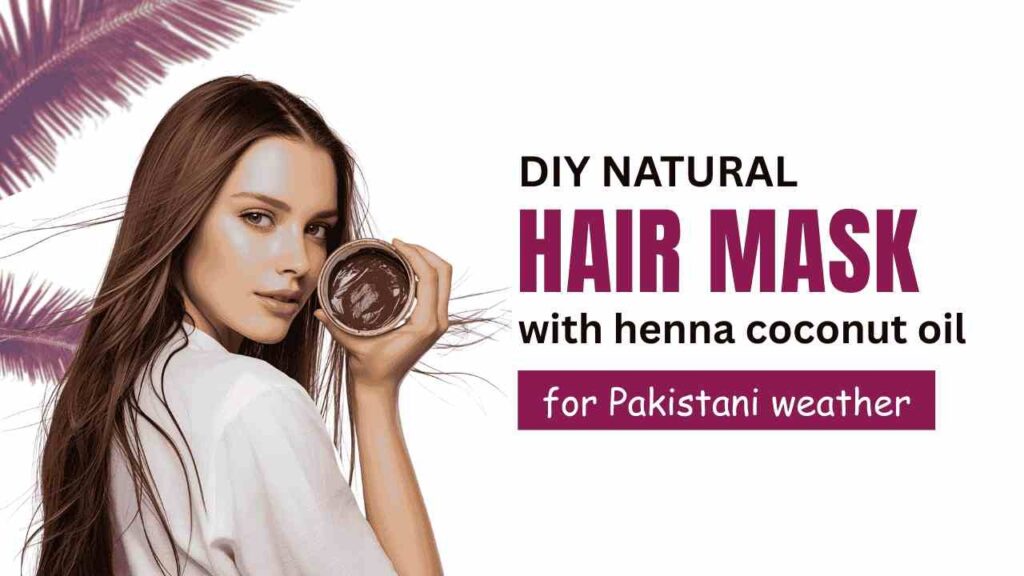Introduction
Pakistani weather can be tough on hair. From scorching summer heat to humid monsoons and dry winter winds, our hair faces constant stress. Many people struggle with dryness, frizz, hair fall, or dullness. The good news? A DIY natural hair mask with henna and coconut oil for Pakistani weather can work wonders.
Henna has been used for centuries as a natural conditioner, while coconut oil deeply nourishes and repairs hair. Together, they create a powerful remedy tailored for the unique climate challenges in Pakistan. In this article, we’ll explore why this mask works, how to make it at home, variations for different hair needs, and extra natural recipes to try.
Why Henna & Coconut Oil Work for Pakistani Hair
 Benefits of Henna
-
Strengthens hair from roots
-
Adds natural shine and softness
-
Reduces dandruff and scalp irritation
-
Helps balance oil production
Benefits of Coconut Oil
-
Penetrates deeply into hair shafts
-
Prevents protein loss in hair
-
Reduces split ends and breakage
-
Protects against humidity-induced frizz
 When combined, they make the perfect all-in-one natural mask for nourishing, protecting, and revitalizing hair in harsh Pakistani weather.
DIY Natural Hair Mask with Henna & Coconut Oil for Pakistani Weather
Ingredients:
-
3 tbsp Henna powder (organic, chemical-free)
-
2 tbsp Coconut oil (preferably cold-pressed)
-
Warm water or green tea (for mixing)
-
1 tbsp Yogurt (optional, for extra softness)
Instructions:
-
Mix henna powder with warm water or green tea until it forms a paste.
-
Add coconut oil and yogurt for added hydration.
-
Apply the paste evenly from scalp to ends.
-
Leave on for 30–45 minutes.
-
Rinse thoroughly with mild shampoo.
Result: Hair feels stronger, shinier, and more manageable.
Variations for Different Hair Needs
1. Home-made Honey Yogurt Hair Mask Recipe for Dry Hair Pakistan
Dry winters in Pakistan can strip hair of moisture. Try this version:
-
2 tbsp Henna
-
1 tbsp Coconut oil
-
1 tbsp Honey
-
2 tbsp Yogurt
 This mask hydrates dry, brittle hair and restores softness.
2. DIY Banana Olive Oil Hair Mask for Frizzy Hair in Lahore
Humidity in Lahore often causes frizz. Try this mask:
-
1 ripe banana (mashed)
-
1 tbsp Olive oil
-
1 tbsp Honey
 Smooths frizz, tames flyaways, and adds shine.
3. Natural Egg Yogurt Hair Mask to Strengthen Hair Roots Karachi
Karachi’s pollution and salty air weaken roots. Try this:
-
1 egg (beaten)
-
2 tbsp Yogurt
-
1 tbsp Coconut oil
 Strengthens roots, prevents hair fall, and boosts growth.
4. Herbal Amla Shikakai Hair Mask for Hair Growth in Pakistan
For growth and thickness:
-
2 tbsp Amla powder
-
2 tbsp Shikakai powder
-
2 tbsp Coconut oil
-
Water to mix
Encourages healthy growth and controls dandruff.
5. Cold-Pressed Coconut Oil and Henna Mask for Dull Pakistani Hair
If your hair looks lifeless:
-
3 tbsp Henna
-
2 tbsp Cold-pressed coconut oil
-
1 tsp Lemon juice
Adds natural shine and restores dull hair.
6. How to Make Hibiscus Avocado Hair Mask at Home in Islamabad
Islamabad’s dry winters need intense hydration:
-
1 ripe avocado
-
3 hibiscus flowers (blended)
-
1 tbsp Coconut oil
 Deeply moisturizes and reduces dryness.
7. DIY Aloe Vera Olive Oil Mask Moisturizing for Pakistani Humidity
For sticky humid days:
-
2 tbsp Aloe vera gel
-
1 tbsp Olive oil
-
1 tbsp Honey
Hydrates while keeping hair light and frizz-free.
Tips for Best Results
-
Use once a week for long-term benefits.
-
Always use organic henna without added chemicals.
-
Cover hair with a shower cap to lock in moisture.
-
Rinse with lukewarm water (avoid very hot water).
Conclusion
A DIY natural hair mask with henna and coconut oil for Pakistani weather is one of the simplest yet most effective remedies for healthier hair. From tackling dryness in winter to frizz in humid summers, this mask adapts to all conditions. With small variations like adding yogurt, honey, or herbs, you can customize it for your specific hair needs.
Natural remedies are not just cost-effective but also safe, chemical-free, and rooted in tradition. Consistency is the key—use these masks weekly, and you’ll notice stronger, shinier, and more resilient hair.
FAQs
1. Can I use henna and coconut oil mask every week?
Yes, once a week is safe. Overuse of henna alone may dry hair, but adding coconut oil balances it.
2. Does this mask change hair color?
Henna may add a slight reddish tint if used alone. Mixing with coconut oil reduces the color effect.
3. Can men also use these masks?
Absolutely! These natural masks work for both men and women.
4. Is it safe for chemically treated or dyed hair?
Yes, but test on a small section first, as henna can alter dyed hair color.
5. How long until I see results?
With consistent weekly use, noticeable results appear in 3–4 weeks.
Â



